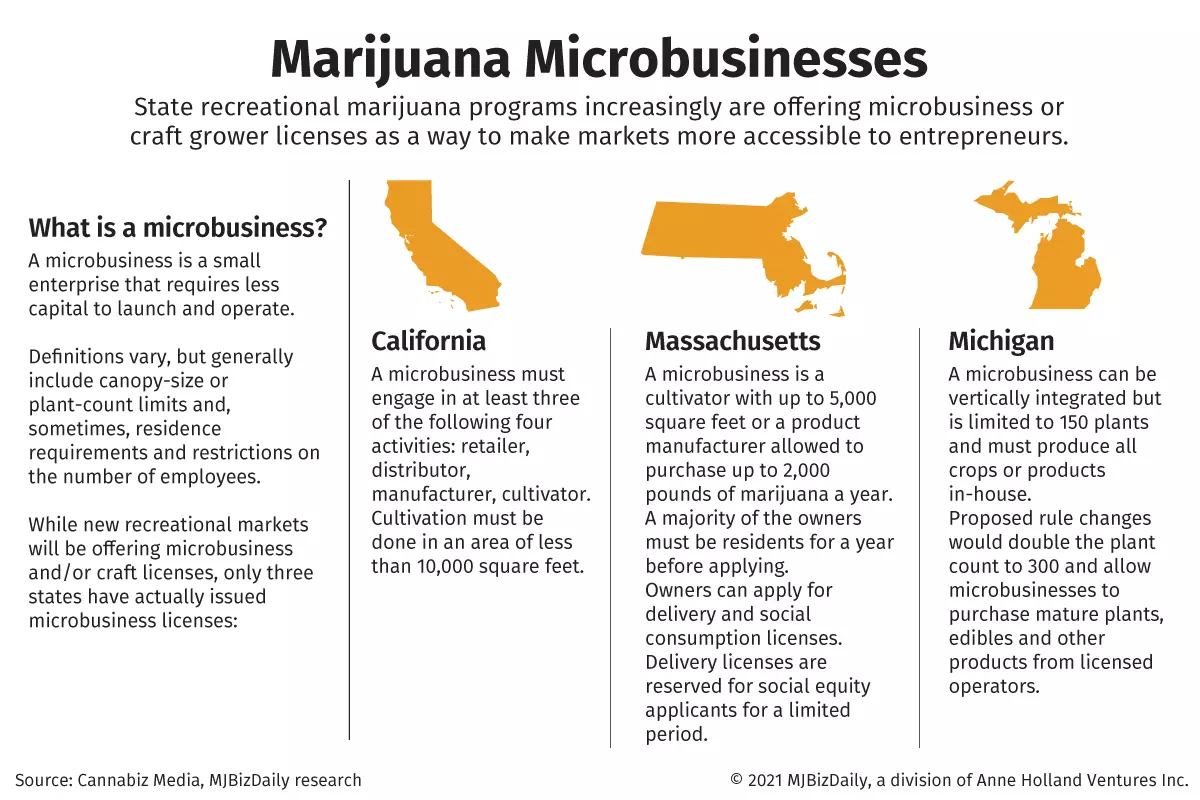Marijuana Microbusinesses
State recreational marijuana programs increasingly are offering microbusiness or craft grower licenses as a way to make markets more accessible to entrepreneurs.

More states are offering microbusiness licenses to cannabis entrepreneurs in an effort to diversify a market that some fear could become dominated by large, deep-pocketed multistate operators.
But the jury is still out on how successful such efforts will be.
So far, only three states have issued microbusiness licenses that require less capital to launch and operate a small, plant-touching enterprise: California, Massachusetts and Michigan.
Michigan already is moving to tweak its program to make it easier for microbusiness operators to survive and thrive.
“A lot of states are talking about the microbusiness game, but few have enacted it,” said Ed Keating, co-founder and chief data officer of Cannabiz Media, a Connecticut-based firm that provides licensing data and other business intelligence.
New recreational cannabis states that haven’t yet issued licenses – but have developed microbusiness and/or craft grower programs – include Connecticut, Illinois, New Mexico, New Jersey, New York, Vermont and Virginia.
A draft bill also is in the works in Washington state to provide a “craft cannabis endorsement” designed to allow small, independently owned cultivators and processors to conduct on-site retail sales to individuals 21 and older.
Helping those with less access to capital
The programs have similar goals.
“It’s a way to make the business more accessible to citizens of the state that don’t have access to large amounts of capital,” Keating said.
“It’s often a nod to social equity,” he added, referring to efforts to help entrepreneurs who have been disadvantaged by the war on drugs.
“And it’s also maybe a hedge against big cannabis.”
A microbusiness generally is defined as a small enterprise that employs 10 people or fewer.
But in the cannabis industry, it’s often defined by the number of plants that can be grown or the maximum size of the cultivation facility.
Some programs also have residency requirements.
“All of these states are trying to figure out the best way of doing it, and it’s not easy,” Keating said.
In most cases, states allow microbusinesses to be vertically integrated to help them become more economically viable.
California is by far the leader, having issued more than 300 microbusiness licenses, according to state data tracked by Cannabiz Media.
As of late November, Michigan had issued seven microbusiness licenses and Massachusetts six.
Massachusetts is the most transparent, listing businesses that also have provisional licenses and identifying the type of business.
Of the six that Massachusetts has licensed, one is female-owned and one is veteran-owned, according to the state’s data base.
Of the 17 that had provisional licenses as of Dec. 1, five were female-owned and two were minority-owned.
Based on the activity so far, the Massachusetts program is more about small business and less about social equity.
But separately, the state is giving social equity applicants exclusive access to cannabis delivery licenses for a limited period of time.
Double-edged sword
Amber Littlejohn, executive director of the Minority Cannabis Business Association, said “microbusinesses can be a great thing.”
“However, when there are arbitrary limits on growth and structure, they are not,” she told MJBizDaily.
Take New Jersey, for example. Microbusinesses there will be capped at 10 employees and a maximum cultivation area of 2,500 square feet.
“The New Jersey model, with the low canopy limits and limits on employees, as well as limits on the number of micro licenses one can hold, is unsustainable and will never allow operators to benefit from scale,” Littlejohn said via email.
Michigan is an example of a state that is proposing changes to its microbusiness structure in efforts to make it more viable, only two years after initial regulations took effect.
The proposed changes include doubling the maximum plant count from 150 to 300 and allowing microbusinesses to purchase mature plants, edibles, concentrates, vaping cartridges and other products from licensed operators rather than having to do everything in-house.
Microbusiness operators, however, would no longer be allowed to do their own processing unless they acquired a separate processing license.
Andrew Brisbo, director of the state’s Marijuana Regulatory Agency, explained the rationale behind the proposed changes at the National Cannabis Industry Association’s Midwest Business Conference in September.
As reported by MLive.com, Brisbo said he heard about two challenges to microbusiness viability:
- A low plant count.
- The high cost of establishing in-house processing operations.
As a result, the state is proposing to double the plant count, “and by eliminating the processing piece altogether, it eases the regulatory burden as well as helps us keep the costs a little lower,” Brisbo said.
Helen Sun, operations manager for Sun Provisions, a vertically integrated cannabis microbusiness in Decatur, Michigan, characterized the changes as positive.
She told MJBizDaily that additional plants are needed to offer a larger range of products to compete with other operators.
Sun said it’s been a struggle running a microbusiness where we “have to do it all. We have to be masters of it all, and what we’re allowed to do is different from other operators.”
But she expressed concern about how the new rules could affect Sun Provisions, which is minority- and female-owned by her mother.
“We built our model under the old rules,” Sun said, which included investing roughly $500,000 into a building and converting the business to a cultivation and processing facility.
“We’ve already put so much money into our laboratory and our kitchen to make gummies, extracts, distillates. We aren’t willing to give that up to double our plants. We don’t want to be punished for being early adopters.”
Keating of Cannabiz Media predicts that more states will implement microbusiness programs and that regulators will develop and adjust rules depending on what is and isn’t working elsewhere.
“We are going to see more of this, and it will be fascinating to watch the differences across the states,” he said.
“What we’ve learned, if anything, in the last seven years is each state is a sovereign nation when it comes to cannabis.”

